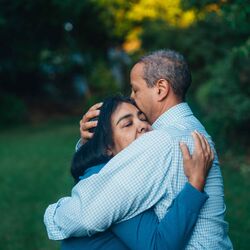Individual personal counselling is a gift. It can be a lifeline for so many and has certainly been one for me.
I experienced trauma as a child and have spent my life dealing with and sorting out the aftereffects. My trauma affected me in many ways and whenever I have been stuck in my day to day life, I have taken time to see a counsellor to help me unpick what is actually going on for me.
I find the experience to be one in which I bring my complex array of thoughts, struggles and issues into the room; it’s a mess and I’m overwhelmed. The counsellor helps me follow some of the threads to the point of origin. I see (sometimes for the first time, sometimes again) where my thinking has been broken and twisted because of the trauma. I also understand where my behaviour, though seemingly random, has been bedded in, because of what I ‘learnt’ at such a young age. I bring a new and fresh understanding to my life which in turn brings ever increasing freedom from my negative ways of thinking and destructive behaviours. I have been through this cycle a number of times when different issues have come to the fore in my life and it has been life changing.
But sometimes the counselling relationship becomes something that can get in the way of a thriving marriage instead of helping it to succeed. How is that?
What if we put our counselling conversations in the place of conversations with our marriage partner?
What if we use our counsellor, not as someone who can help us understand more about ourselves to then bring freedom in our relationships, but as the one we go to talk about all the hard things?
And the problem with that is this: a relationship with a counsellor is one-sided, they are there for you, you don’t have to balance their needs and yours, you don’t have to negotiate what you want versus what they want. You don’t have to take into account their feelings. They are just there for you. They want what’s best for you. They are being paid to listen and invest in you.
How very different to the marriage relationship; one where we seek to give ourselves fully, where we aim for vulnerability with our partner, even while we know that they are not perfect and may hurt us. Growing openness and transparency in a relationship was helpfully explored in the blog: Going deeper in your communication to build intimacy and trust and it takes courage as well as effort.
Counselling from a professional can be so life-giving to a marriage, so what are some red flags we should look out for?
- Are you holding back from your partner and waiting to talk things through with your counsellor?
- Are you unable to share with your partner anything that you have talked about in your counselling sessions?
- Are you becoming emotionally dependent on your counsellor?
- Have you started to think that your partner doesn’t understand you?
Not being a counsellor myself, I don’t claim to understand the profession fully. I see the benefits and have first hand experience of them, and I am so thankful for the great counsellors I have worked with. But I can see how it would be easy to become dependent on a counsellor and how that can become a cause for concern In my view we mustn’t swap the dependant, one sided, safe counselling relationship for our actual real lives. If we do, that’s when counselling becomes unhelpful instead of helpful for your marriage.
Counselling, in its right place, can be a great route to having deeper conversations with your partner which is a big positive. If you have unravelled some of your issues, then it builds real trust and intimacy to be able to share that with your partner. And in turn your partner can be more supportive of what you’re going through.


